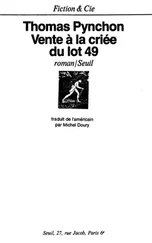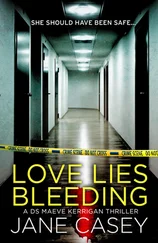They cast off silently. Thirty feet from shore, Sid angles an ear upriver. “Shit.”
“Not again, Sid.”
“Twin V-8s, Cats most likely. This time of night, it has to be the goldurn DEA. Jeez, what am I, Pappy Mason here?” He starts the engine, and off they go barrelassing into the night, roostertailing down the Hudson through a moderate chop, slapping against the water in a good solid rhythm. Maxine watches the 79th Street boat basin pass swiftly by on the port side. “Hey, that was my stop. Where we going now?”
“With this joker,” March mutters, “it’s probably out to sea.”
The thought did enter Sid’s mind, as he admits later, but that would have brought the Coast Guard into this too, so instead, gambling on DEA caution and hardware limitations, with the World Trade Center leaning, looming brilliantly curtained in light gigantically off their port quarter, and someplace farther out in the darkness a vast unforgiving ocean, Sid keeps hugging the right side of the channel, past Ellis Island and the Statue of Liberty, past the Bayonne Marine Terminal, till he sees the Robbins Reef Light ahead, makes like he’s going to pass it too, then at the last minute hooks a steep right, nimbly and not always according to the rules of the road proceeding then to dodge anchored vessels towering in out of nowhere and oil tankers under way in the dark, sliding into Constable Hook Reach and on down the Kill Van Kull. Passing Port Richmond, “Hey, Denino’s somewhere off the port beam here, anybody feel like grabbing a pizza?” Rhetorical, it seems.
Under the high-arching openwork of the Bayonne Bridge. Oil-storage tanks, tanker traffic forever unsleeping. Addiction to oil gradually converging with the other national bad habit, inability to deal with refuse. Maxine has been smelling garbage for a while, and now it intensifies as they approach a lofty mountain range of waste. Neglected little creeks, strangely luminous canyon walls of garbage, smells of methane, death and decay, chemicals unpronounceable as the names of God, the heaps of landfill bigger than Maxine imagines they’d be, reaching close to 200 feet overhead according to Sid, higher than a typical residential building on the Yupper West Side.
Sid kills the running lights and the motor, and they settle in behind Island of Meadows, at the intersection of Fresh and Arthur Kills, toxicity central, the dark focus of Big Apple waste disposal, everything the city has rejected so it can keep on pretending to be itself, and here unexpectedly at the heart of it is this 100 acres of untouched marshland, directly underneath the North Atlantic flyway, sequestered by law from development and dumping, marsh birds sleeping in safety. Which, given the real-estate imperatives running this town, is really, if you want to know, fucking depressing, because how long can it last? How long can any of these innocent critters depend on finding safety around here? It’s exactly the sort of patch that makes a developer’s heart sing—typically, “This Land Is My Land, This Land Also Is My Land.”
Every Fairway bag full of potato peels, coffee grounds, uneaten Chinese food, used tissues and tampons and paper napkins and disposable diapers, fruit gone bad, yogurt past its sell-by date that Maxine has ever thrown away is up in there someplace, multiplied by everybody in the city she knows, multiplied by everybody she doesn’t know, since 1948, before she was even born, and what she thought was lost and out of her life has only entered a collective history, which is like being Jewish and finding out that death is not the end of everything—suddenly denied the comfort of absolute zero.
This little island reminds her of something, and it takes her a minute to see what. As if you could reach into the looming and prophetic landfill, that perfect negative of the city in its seething foul incoherence, and find a set of invisible links to click on and be crossfaded at last to unexpected refuge, a piece of the ancient estuary exempt from what happened, what has gone on happening, to the rest of it. Like the Island of Meadows, DeepArcher also has developers after it. Whatever migratory visitors are still down there trusting in its inviolability will some morning all too soon be rudely surprised by the whispering descent of corporate Web crawlers itching to index and corrupt another patch of sanctuary for their own far-from-selfless ends.
A long, eerie wait to see if they’ve shaken the feds or whoever they are. Invisibly up yonder, moving around somewhere close, heavy machinery, much too deep into these early-morning hours. “I thought this wasn’t an active dump anymore,” Maxine sez.
“Officially the last barge came and went back around the end of the first quarter,” Sid recalls. “But they’re still busy. Grading it, capping it, sealing and covering it all up and turning it into a park, another family-friendly yup resource, Giuliani the tree hugger.”
Presently March and Sid are into one of those low-volume elliptical discussions parents have about their children, in this case Tallis mostly. Who may, like her brothers, be a grown adult but somehow demands inflexible disbursements of time and worry, as if she were still a troubled teenager snorting Sharpie pen solvents back at the Convent of the Holy Ghost.
“Strange,” Sid reflective, “to see the way Ice the kid morphed into what he is today. In college he was just this amiable geek. She brought him home, we figured, OK, horny kid, way too much screen time, socially ept as they ever get, but March thought she saw good-provider potential there.”
“Sid having his little joke—hey, live forever, sexist pig. The idea was always for Tallis to know how to take care of herself.”
“Pretty soon we were seeing them less and less, they had all this money, enough for a nice li’l crib down in SoHo.”
“They were renting?”
“Bought it,” March a little abrupt. “Paid cash.”
“By then Ice had profiles in Wired, in Red Herring, then hashslingrz made the Silicon Alley Reporter ’s ‘12 to Watch’ list…”
“You were following his career.”
“I know,” Sid shaking his head, “it’s pathetic ain’t it, but what were we supposed to do? They cut us out. It was like they actively went seeking it, this life they have now, this faraway, virtual life, leaving the rest of us stuck back here in meatspace, blinking at images on a screen.”
“Best-case scenario,” March sez, “Ice was an innocent geek corrupted by the dotcom boom. Dream on. The kid was bent from the jump, under obligation to forces which do not advertise publicly. What did they see in him? Easy. Stupidity. A stupidity of great promise.”
“And these forces—maybe alienating you guys was really part of their program, not Tallis’s idea?”
Both of them shrug. March maybe a little more bitterly. “Nice thought, Maxi. But Tallis collaborated. Whatever it was, she bought in. She didn’t have to.”
The industrial racket from back in the marshland behind the giant cliffs of ruin has grown continuous. Now and then workers, in long-standing Sanitation Department tradition, have lengthy exhilarated screaming exchanges. “Strange shift to be working,” it seems to Maxine.
“Yeah. Nice overtime for somebody. Almost like they’re up to something they don’t want anybody to know about.”
“When did anybody ever want to know?” March lapsing for a moment into the bag-lady character in her commencement speech at Kugelblitz, the one person dedicated to salvaging everything the city wants to deny. “Either they’re playing catch-up or they’re getting it ready to open for dump business again.”
A presidential visit? Somebody’s making a movie? Who knows.
Early seagulls show up from somewhere, begin inspecting the menu. The sky takes on a brushed-aluminum underglow. A night heron with breakfast in its beak ascends from its long watch at the edge of the Island of Meadows.
Читать дальше












